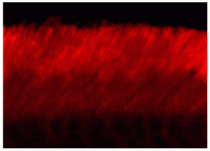ARG52222
anti-ABCA4 antibody [3F4]
anti-ABCA4 antibody [3F4] for IHC-Formalin-fixed paraffin-embedded sections,Western blot and Human,Mouse,Bovine,Xenopus laevis
Neuroscience antibody
Overview
| Product Description | Mouse Monoclonal antibody [3F4] recognizes ABCA4 |
|---|---|
| Tested Reactivity | Hu, Ms, Bov, Xenopus laevis |
| Tested Application | IHC-P, WB |
| Host | Mouse |
| Clonality | Monoclonal |
| Clone | 3F4 |
| Isotype | IgG |
| Target Name | ABCA4 |
| Antigen Species | Bovine |
| Immunogen | Partially purified bovine 220-kDa disc rim protein |
| Conjugation | Un-conjugated |
| Alternate Names | STGD; RMP; RIM protein; ABC10; Stargardt disease protein; Retinal-specific ATP-binding cassette transporter; ARMD2; ATP-binding cassette sub-family A member 4; RIM ABC transporter; FFM; RP19; ABCR; STGD1; CORD3; RmP |
Application Instructions
| Application Suggestion |
|
||||||
|---|---|---|---|---|---|---|---|
| Application Note | Specific for ABCA4 * The dilutions indicate recommended starting dilutions and the optimal dilutions or concentrations should be determined by the scientist. |
Properties
| Form | Liquid |
|---|---|
| Purification | Protein G purified |
| Buffer | 10 mM HEPES (pH 7.5), 150 mM NaCl, 0.1 mg/ml BSA and 50% Glycerol |
| Stabilizer | 0.1 mg/ml BSA, 50% Glycerol |
| Storage Instruction | For continuous use, store undiluted antibody at 2-8°C for up to a week. For long-term storage, aliquot and store at -20°C. Storage in frost free freezers is not recommended. Avoid repeated freeze/thaw cycles. Suggest spin the vial prior to opening. The antibody solution should be gently mixed before use. |
| Note | For laboratory research only, not for drug, diagnostic or other use. |
Bioinformation
| Database Links | |
|---|---|
| Background | ABCA4 (ATP-binding cassette, sub-family A (ABC1), member 4, Rim Protein) is a member of the superfamily of ATP-binding cassette (ABC) transporters (Illing et al., 1997). ABC proteins transport various molecules across extra- and intracellular membranes. This protein is a retina-specific ABC transporter with N-retinylidene-PE as a substrate. It is expressed exclusively in retina photoreceptor cells, indicating the gene product mediates transport of an essential molecule across the photoreceptor cell membrane. Mutations in this gene are found in patients diagnosed with Stargardt disease and are associated with retinitis pigmentosa-19 and age-related macular degeneration (Wiszniewski et al., 2003). Defects in ABCA4 are the cause of Stargardt disease type 1 (STGD1) (Molday et al., 2000). STGD is one of the most frequent causes of macular degeneration in childhood. Defects in ABCA4 are also known to cause fundus flavimaculatus (FFM), age-related macular degeneration type 2 (ARMD2) and cone-rod dystrophy type 3 (CORD3) (Klevering et al., 2005). |
| Research Area | Neuroscience antibody |
| Calculated MW | 256 kDa |
Images (1) Click the Picture to Zoom In






